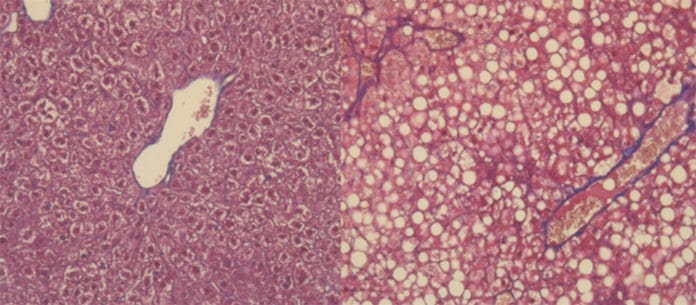Hepatocellular carcinoma (HCC) is the most common type of primary liver cancer. The risk is higher in people with long-term liver diseases or if the liver is scarred by infection with hepatitis B or hepatitis C.
Hepatocellular carcinoma is more common in people who drink large amounts of alcohol and who have an accumulation of fat in the liver. Obesity is, therefore, a significant risk factor for the development of this cancer. The trouble in distinguishing it and the absence of targeted treatment contribute to the severity of this disease, which causes the death of more than 700,000 people each year around the world.
Michelangelo Foti, Professor and Director of the Department of Cell Physiology and Metabolism at UNIGE Faculty of Medicine, “We already know that a fatty liver can become inflamed and progress into cancer, but very little is known about the molecular mechanisms responsible for these pathologies. The fatty liver disease already affects nearly 30% of the world’s population and will very quickly become a major public health problem.”
Scientists at the University of Geneva (UNIGE) have discovered a protein involved in the progression of a “fatty liver” towards cancer. The protein called S100A11, could not only allow early detection of the risk of developing liver cancer, but also open the way to new targeted therapies.
Scientists, through this study, sought to determine changes in the expression of specific proteins that could promote cancer development. Several studies, until now, had focused mainly on genetic mutations associated with liver cancer, but this has not led to effective treatments. Thus, scientists wanted to determine other alterations that could explain the progression of a fatty liver towards an inflammatory state and cancer.
Cyril Sobolewski, scientists at the Department of Cell Physiology and Metabolism and first author of this work, said, “It turns out that a whole network of proteins becomes deregulated, in the absence of any genetic alterations, thereby creating an amenable environment to the development of cancer. Among this network, the protein S100A11 particularly caught the attention of scientists.”
“We first discovered that S100A11 promotes inflammation and build-up of fibrous tissue in the liver. Additional tests showed that the more S100A11 was expressed, the greater the severity of cancer.”
The discrete symptoms of liver inflammation and cancer play an essential role in their dangerousness. Still, the presence of S100A11 in the blood raises the possibility of early detection by simple blood sampling. The earlier the patient is treated, the greater the chances of survival.
“Also, S100A11 may be a promising therapeutic target, says Cyril Sobolewski. The next step would be to generate specific antibodies able to neutralize the protein and prevent its carcinogenic effect.” This type of approach, called immunotherapy, has already shown promising results in the fight against several cancers.”
These results, published in the journal Gut, highlight the close links between our diet and cancer development.
